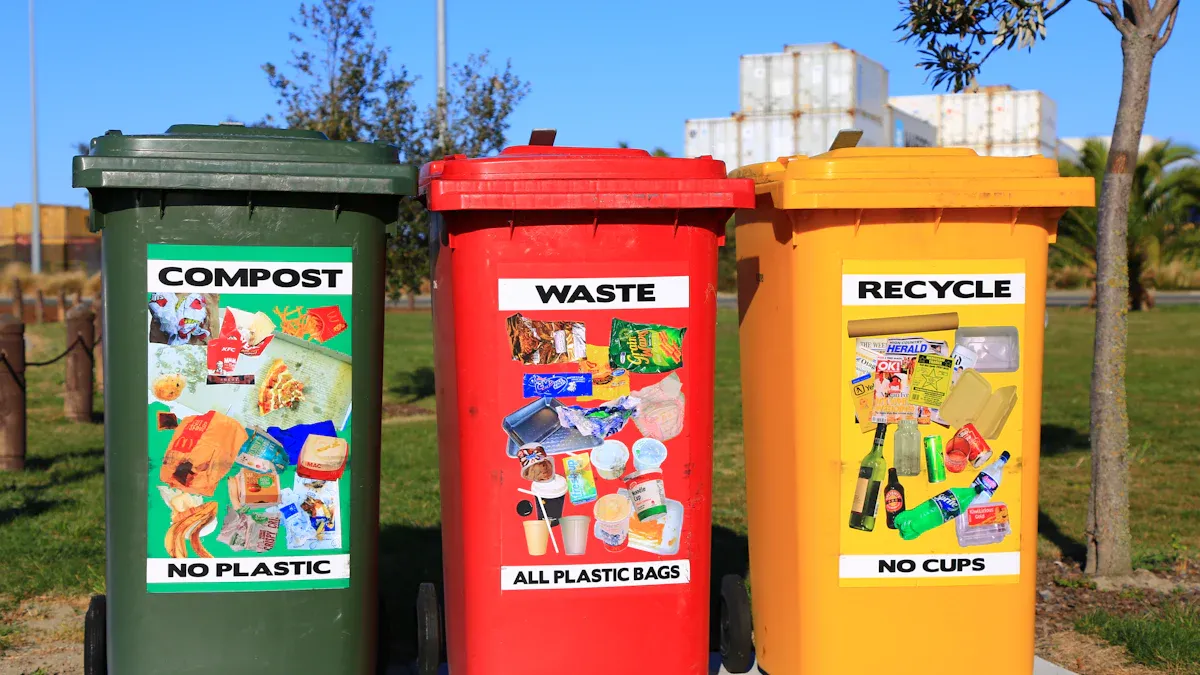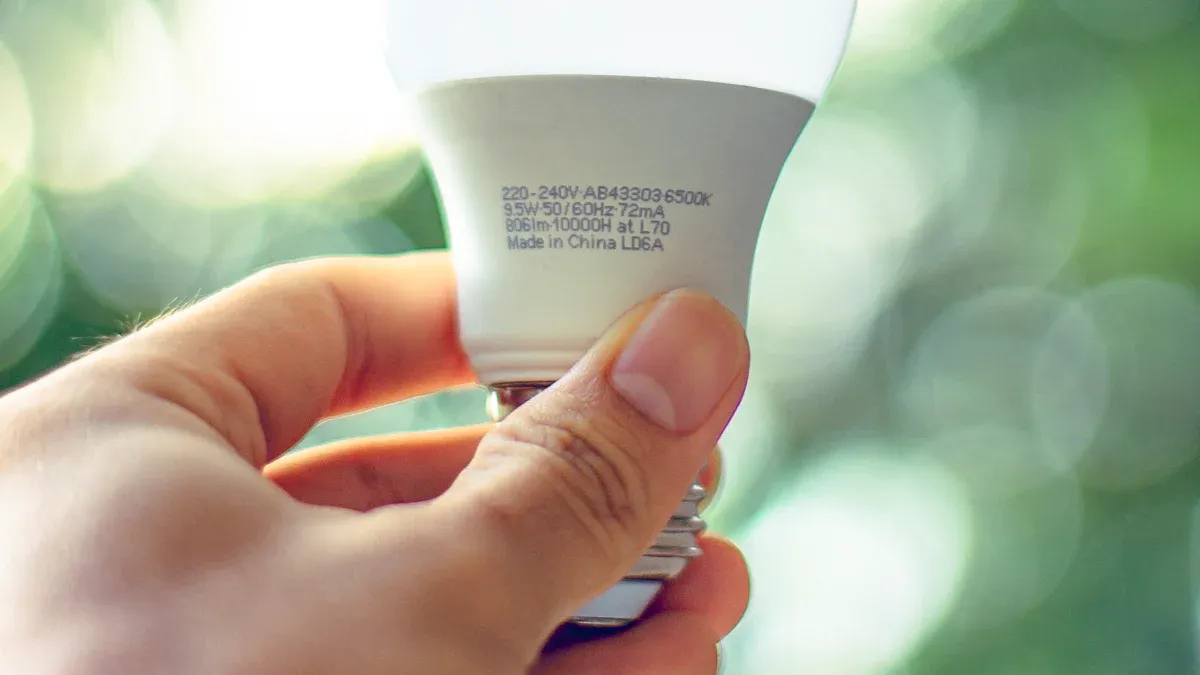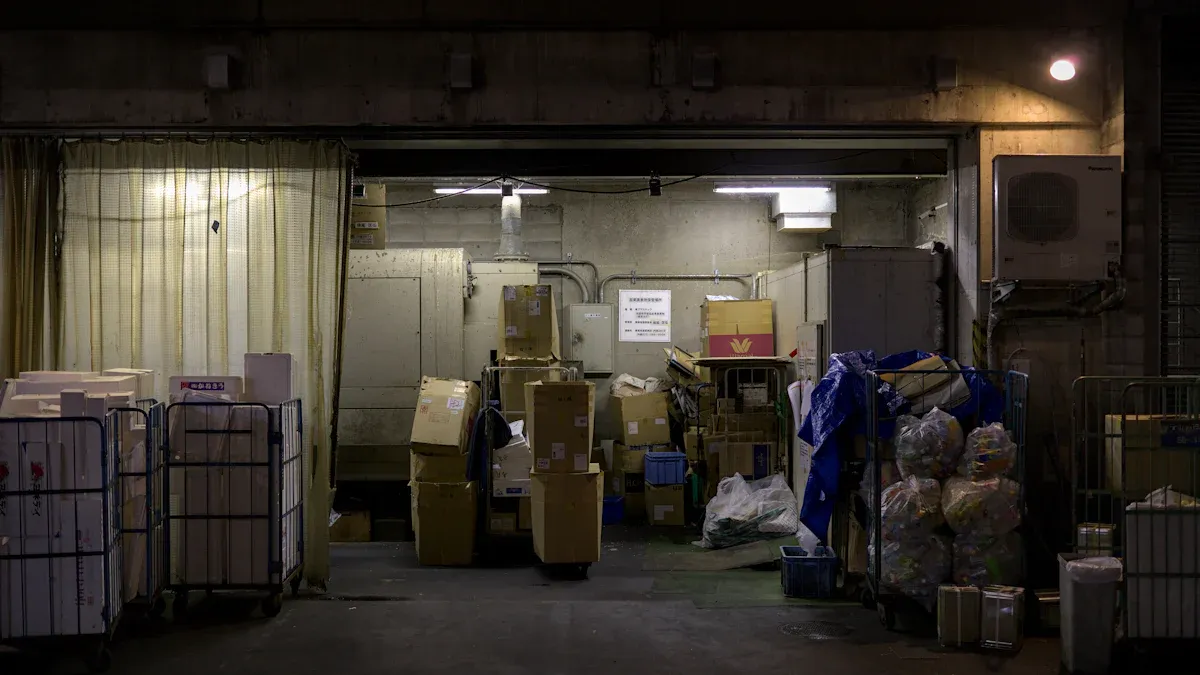LED Lamp Disposal: Differences Between Residential and Commercial Approaches

When you throw away a Led Light at home, there are fewer rules. Businesses must follow strict rules for LED Lamp Disposal. You can often put old lamps in the trash at home if your town allows it. The effect on the environment is not the same. If businesses do not follow rules, bad materials can get out. You can see these differences in the table below:
Sector | Regulations | Environmental Impact |
|---|---|---|
Residential | Not covered by hazardous waste rules; no laws for disposal. | You can throw away lamps with normal trash if your town says it is okay. |
Commercial | Must follow tough rules for hazardous waste or Universal Waste Rule. | If not done right, bad things like mercury and lead can get into nature. |
If you want to know more About Us or our Product, you will find good information in the next parts.
Key Takeaways
Getting rid of LED lamps at home is usually easy. You can put old bulbs in the trash if your town says it is okay.
Companies have to follow special rules for LED lamp disposal. They cannot put bulbs in the trash. They must use recycling programs.
Recycling LED bulbs helps the environment. It stops bad materials from hurting nature. It also saves useful metals.
Always look up your local rules before throwing away LED lamps. Some places have special recycling or rules you must follow.
To stay safe, keep old bulbs in a strong box so they do not break. Tell your friends and family how to throw away bulbs safely. This helps everyone stay safe.
Residential LED Lamp Disposal

Household Methods
You have a few ways to get rid of old LED lamps at home. Some people sell their used bulbs to scrap dealers. Others throw them away with their regular trash. Many people use these methods. The table below shows how often each way is used:
Disposal Method | Prevalence (%) |
|---|---|
Selling e-wastes to scrap dealers | 35 |
Disposing with household waste | 21 |
Selling e-waste is the most common choice. But lots of people still put bulbs in the trash. Getting rid of LED lamps at home is easy. LED bulbs do not have dangerous stuff like mercury. You can usually throw them away with your normal garbage if your town says it is okay. Recycling is better because it helps the planet.
Local Rules
You should learn your local rules before you throw away or recycle LED bulbs. Some states have strict laws for lamp disposal, especially for bulbs with mercury. The table below shows what some states do:
State | Regulation Description |
|---|---|
Maine | Does not let people throw away mercury lamps in the trash; recycling is paid for by manufacturers. |
Massachusetts | Does not allow mercury lamps in landfills or incinerators since May 1, 2008. |
Vermont | Does not let people throw away mercury lamps in the trash; recycling is paid for by manufacturers. |
Washington | Makes people recycle all mercury lights; paid for by a fee at stores. |
Check your city or state website for the newest rules. Most places do not treat LED Lamp Disposal as hazardous waste. You might find special recycling programs for all bulbs.
Homeowner Tips
You can make LED Lamp Disposal safer and easier by following some simple steps. Environmental groups give these tips:
Look up your local rules. Ask your local government if they recycle LED bulbs. Some cities have drop-off spots or pick-up days.
Find recycling centers. If your town does not recycle LED bulbs, use websites like Earth911 or ProductCare Recycling to find a place nearby.
Be careful when storing and moving bulbs. Put old bulbs in a safe container so they do not break. This stops broken glass or other things from hurting you.
Tip: Always handle old bulbs gently. LED bulbs are not dangerous, but broken glass can hurt you.
Many people do not know the best way to get rid of LED bulbs. You can help by telling friends and family what you learn. Safe LED Lamp Disposal keeps your home and neighborhood safe.
Commercial LED Lamp Disposal

Business Procedures
Businesses must follow special steps for LED Lamp Disposal. You cannot put old bulbs in the trash. Most companies use recycling programs for used lamps. These programs help get valuable materials from each lamp. LED lamps have metals like gold, silver, and copper. They also have rare earth elements inside. These metals make recycling LED lamps worth more than other bulbs. Recycling also keeps harmful things like arsenic out of nature.
Many companies set up regular pick-ups or drop-offs for lamps. You might use a recycling box or work with a local center. Some businesses join programs to show they care about safe disposal. These actions help you follow rules and protect your company’s name.
Note: Recycling LED lamps saves resources and helps you avoid fines.
Compliance
You must follow strict rules for LED Lamp Disposal at work. The government wants to keep people and nature safe. You need to keep records and fill out paperwork. If you do not follow rules, your business could get big fines.
Here is a table that shows the main compliance requirements for businesses:
Compliance Requirement | Description |
|---|---|
Obtain an EPA ID | Required for businesses disposing of hazardous waste. |
Hazardous Waste Manifest | Required for transportation of hazardous waste. |
Certified HW Hauler | Must be used for transportation of hazardous waste. |
UWR Exemption | If recycling under UWR, a hazardous waste manifest is not required. |
Common Carrier | Can be used for shipment to recycling facilities under UWR. |
Treatment Compliance | Crushing lamps is considered treatment and requires full Subtitle C compliance unless state regulations allow otherwise. |
TCLP Testing | Lamps must pass the TCLP test to be considered non-hazardous. |
CESQG Exemption | Small quantity generators may have exemptions but must still manage waste properly. |
You also need to keep records of how you get rid of lamps. The law says you must show proof if asked. Your business has more risk than a home. If you do not dispose of lamps right, you could pay for cleanup later. Many companies recycle lamps to lower risk and meet green standards.
Bulk Recycling
Businesses often have lots of lamps to throw away. You need bulk recycling to handle many bulbs at once. These services make LED Lamp Disposal easier for your company. You can pick from different programs based on your needs.
Recycling Option | Description | Best For |
|---|---|---|
Recycle Pak program | A simple, cost-effective program for smaller quantities of waste. | Small businesses with standard needs |
Bulk recycling | Designed for larger quantities, ideal for businesses with several hundred items. | Businesses with large quantities |
Regency Truck Pick-Up | Local pick-up service for recycling containers within a set radius. | Local properties near distribution centers |
Bulk recycling helps you keep up with lots of lamp disposal. These programs include pick-up, safe transport, and recycling. When you use bulk recycling, you help your company recycle more and help nature. You also make sure you follow all rules and do not make mistakes.
Tip: Always pick a recycling program that fits your business size and needs.
Key Differences in LED Lamp Disposal
Comparison Table
You can look at this table to see how homes and businesses get rid of LED lamps. The table shows how each group deals with cost, how easy it is, and what happens to the environment.
Aspect | Residential Approach | Commercial Approach |
|---|---|---|
Cost | Usually free or low cost. | May include fees for recycling and transport. |
Convenience | Simple. You can use regular trash or local recycling. | Needs special programs and documentation. |
Environmental Impact | Safer than fluorescent bulbs. No mercury. | Safer than older bulbs. Must follow strict rules to protect nature. |
Regulations | Few rules. Most places allow regular disposal. | Many rules. Must follow government standards. |
Volume | Small amounts. | Large amounts. Needs bulk recycling. |
Liability | No legal risk for improper disposal. | Risk of fines or penalties for mistakes. |
Tip: Recycling your LED bulbs is better for the planet. Even if your town lets you throw them away, recycling helps more.
Why Differences Exist
The rules for getting rid of LED lamps are not the same everywhere. Homes and businesses have different needs. At home, you might only throw away a few bulbs each year. Businesses change many bulbs at once. They need special recycling for all those bulbs.
Rules are also different. At home, you do not have to follow many laws. Businesses must keep records and use approved recycling places. These rules help keep the earth safe and stop bad things from getting into landfills.
Getting rid of LED lamps is easier than throwing away fluorescent bulbs. LEDs do not have mercury or other dangerous stuff. You do not need special steps. This makes it safer and easier for everyone. Businesses save money because they do not pay for hazardous waste removal. Recycling instead of trashing bulbs is better for the earth.
Liability is another big difference. You will not get in trouble for throwing away a bulb at home. Businesses can get fined if they do not follow the rules. They must show proof that they got rid of bulbs the right way. This is why homes and businesses use different ways to dispose of LED lamps.
Best Practices
For Residents
You can help by using smart steps for LED Lamp Disposal at home. First, check if your local recycling center takes LED bulbs. Many centers have bins or special days for drop-off. Put old bulbs in a strong box so they do not break. If you have more than one bulb, keep them together to make carrying easier.
Find recycling programs near you.
Keep used bulbs safe until you recycle them.
Ask your waste service about pick-up choices.
Tell neighbors what you learn to help everyone.
Tip: Be gentle with bulbs so glass does not break. LED bulbs do not have mercury, but broken glass can still hurt you.
Recycling helps the planet. It also keeps your home clean and safe.
For Businesses
You need a good plan for LED Lamp Disposal at work. A recycling program helps you follow rules and care for nature. You can pick pick-up, mail-in, or take bulbs yourself, depending on your needs.
Make a recycling plan that fits your business size.
Teach workers how to handle and recycle bulbs safely.
Keep track of disposal with records like Certificates of Recycling.
Add recycling costs to your yearly budget.
Use mail-back programs for easy and safe disposal.
Recycling LED bulbs gets back metals and glass. This means less mining and lower costs for new things. Recycling also takes away bad stuff, keeping water and soil safe. The recycling business gives people jobs and helps the economy grow.
Note: Good records and training help you avoid fines and show you care about the planet.
When you use best practices, you set a good example. Your business becomes safer and gets a better name.
You have different rules for LED Lamp Disposal at home and work. At home, you can use regular trash or recycling. At work, you must follow strict laws and keep records. You should protect nature and stay safe by doing these things:
Ask your local waste service about recycling programs.
Use websites to find recycling centers close to you.
Learn from ads and posters about safe disposal.
LEDs do not have mercury. This makes them safer for the earth than old fluorescent bulbs. Recycling helps keep water and soil clean.
Always choose safe disposal and follow your local rules.
FAQ
What should you do if your town does not recycle LED lamps?
You can search for recycling centers online. Earth911 and ProductCare Recycling help you find places nearby. You can also ask your local waste service for advice.
Can you throw LED bulbs in the regular trash?
Most towns let you put LED bulbs in the trash. You should check your local rules first. Recycling is always better for the environment.
Why do businesses need special disposal programs for LED lamps?
Businesses use many bulbs. Laws require safe disposal and recycling. You must keep records and follow rules to avoid fines.
Do LED bulbs contain hazardous materials?
LED bulbs do not have mercury. They have small amounts of metals. You can handle them safely. Broken glass can hurt you, so use care.
How can you make LED lamp disposal safer at home?
Tip: Place old bulbs in a sturdy box. Carry them gently. Take them to a recycling center if possible. Share what you learn with friends and family.
See Also
Comparing LED Lighting Solutions With Conventional Light Sources
Evaluating LED Streetlights Against Conventional Lighting Choices
Exploring Indoor LED Lamps: Varieties, Advantages, And Uses
Business Lighting Strategies: Effective Solutions And Best Practices

